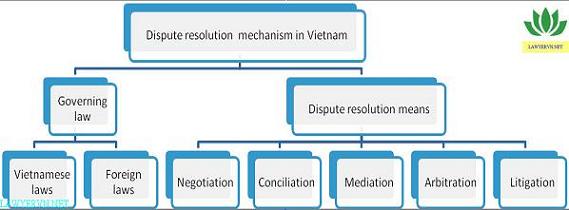About dispute resolution in Vietnam
Introduction to two basic elements in the dispute resolution mechanism in Vietnam: the choice of dispute resolution means and governing law.
Post date: 24-09-2013
14,537 view(s)
1. Introduction about dispute resolution in Vietnam
In any international investment, the choice of dispute resolution mean and governing law is essential to ensure the certainty, stability and enforceability of contractual rights and obligations.

Dispute Resolution Mechanism In Vietnam
Foreign investors in Viet Nam may find themselves negotiating with their Vietnamese partners and counter-parties over:
• the choice of either negociation, conciliation & mediation, arbitration or litigation as the means for resolution of any disputes arising in relation to their investment; and
• the choice of either Vietnamese law or foreign law as the governing law of their contract.
Under Vietnamese law, parties can always choose Vietnamese law and Vietnamese courts in their contracts. This is in fact the default position. In addition, where the relationship is a commercial one under the Law on Commercial Arbitration, parties can choose to arbitrate under that Law. However, the choice of foreign law or international arbitration can be more problematic. Making the ”right” choice will depend on the particular circumstances of each individual contract, and it is important to understand the advantages and risks posed by each possible choice as well as the mandatory Vietnamese rules which may impact on the available choices.
2. Governing Law for dispute resolution in Vietnam
The governing law of the contract is the law that is applied in regulating the relationship between the parties to the contract. This is different to the mandatory law of the place where the contract is performed (for example regulations on labour or environment) which must be complied with irrespective of the chosen governing law. A choice of foreign governing law will not release a foreign investor from any obligation under Vietnamese law.
Generally speaking, Vietnamese law permits the choice of a foreign law only where the contract involves a ”foreign element”, which typically means the involvement of a foreign party or an asset located overseas. But the permission for a choice of foreign law is often heavily qualified, including by the provison that the foreign law (or its choice or its application) must not contradict the ”fundamental principles of Vietnamese law”. In particular:
o the Investment Law allows a choice of foreign law ”with respect to foreign investment activities”, but only where Vietnamese law is silent and the application of the chosen foreign law does not contradict the fundamental principles of Vietnamese law;
o the Commercial Law permits a choice of foreign law for commercial contracts involving foreign elements, again provided that the foreign law does not contradict the fundamental principles of Vietnamese law; and
o although the Civil Code allows parties to a contract involving a ”foreign element” to choose a foreign law (provided that the choice does not contradict a provision of Vietnamese law), the Code further stipulates that where the contract is signed and performed wholly in Viet Nam, it must be governed by Vietnamese law.
The fact that these choices of foreign law are variously subject to the principles and provisions of Vietnamese law (which cannot be definitively determined) may mean that a choice of foreign governing law, even where permitted, may not ultimately result in the application of foreign law in the manner intended or anticipated by the foreign party, in particular where the matter ends up in a Vietnamese court.
3. Dispute resolution means in Vietnam
3.1 Dispute resolution in Vietnam by negotiation
Negotiation is a method of dispute resolution in business in Vietnam without the role of the third party. The negotiation having the basic characteristics inludes parties together to present views, opinions, discuss and find appropriate measures, and reach a consensus agreement to resolve the disagreement.
This method has following advantages:
- A convenient, fast, simple, flexible, efficient and inexpensive.
- Protection of reputation and business secrets of the parties
Otherwise, this method has following disadvantages:
- The result of the negotiation depends on understanding and attitude, goodwill and cooperation of the parties.
- The results of the negotiations are not enforced by a legal mechanism, which depends on the willingness of the parties to implement.
3.2.Dispute resolution in Vietnam by conciliation and mediation
3.2.1. The Role of mediation and conciliation
Given the significant weakness in the Vietnamese court system (please see discussion below) it is essential that the parties to any dispute attempt to reach an amicable settlement through mediation and conciliation.
The Vietnamese law itself acknowledges this by requiring the parties to certain disputes (including civil, labour and family) at least attempt mediation before permitting them to start litigation proceedings. Further if litigation is initiated the court will arrange conciliation meetings be held in an attempt to reach an amicable settlement without a court hearing (see below). Unfortunately despite this recognition of the importance of these disputes resolution methods Vietnam does not yet have any organizations or individuals specializing in mediation or conciliation. However groups of non-professional mediators are set up to carry out mediation at the local community level
3.2.2 Enforcement
The method of enforceability depends on how the settlement was reached. If the parties reach a settlement during mediation or conciliation that agreement will be enforceable as a normal contractual agreement. As such all the usual contractual remedies will be available should either party breach any of the agreement provisions. However, any pre-trial settlement agreement reached at a court arranged conciliation meeting will be recognised as a judge”s decision and deemed final and enforceable against the parties as such.
3.3. Dispute resolution in Vietnam by arbitration
Vietnam’s court system remains underdeveloped and it can be cumbersome and time-consuming to initiate a court action and obtain a court ruling in Vietnam. In 2003, arbitration became an official mechanism for resolving disputes arising from “commercial activities.” In June 2010, the Vietnam National Assembly passed the Law on Commercial Arbitration, which took effect on 1 January 2011 (“Arbitration Law”). The Arbitration Law is aimed at encouraging the resolution of disputes in Vietnam by arbitration and facilitating the development of commercial arbitration activities in Vietnam in accordance with the country’s ongoing socioeconomic development.
3.3.1. Dispute resolution in Vietnam by domestic arbitration
Domestic arbitral awards are enforceable in the same way as court judgments. Historically, however, the choice of Vietnamese arbitration for disputes was less popular due to limitations in the commercial arbitration framework, including a lack of party autonomy in appointing arbitrators and the inability for arbitration tribunals to order interim relief.
From 1 January 2011, however, the arbitration environment in Viet Nam will start a new chapter thanks to the new Law on Commercial Arbitration which replaces the existing 2003 Ordinance. The new Law addresses several of the shortcomings of the previous regulation making a choice of domestic arbitration more attractive as the dispute resolution forum for foreign investors.
3.3.2. Foreign Arbitration and Enforcement
International (or foreign) arbitration is expressly permitted under the Investment Law for contracts involving foreign investors or foreign invested companies.
Foreign arbitration is also effectively permitted for commercial disputes by the Commercial Law which, in very general terms, allows disputes to be resolved either by courts or arbitration. While there is no general law permitting a choice of international arbitration for non-commercial disputes, as Viet Nam will only enforce foreign arbitral awards in commercial disputes there would be little value under Vietnamese law in obtaining a foreign arbitral award in a non-commercial dispute in any event.
Enforcement in Viet Nam of any eventual award made by a foreign arbitration body is an important factor to consider in making a choice of foreign arbitration as the forum for dispute resolution. Viet Nam is a party to the New York Convention on Recognition and Enforcement of Foreign Arbitral Awards. Like foreign court judgments and decisions, foreign arbitral awards cannot be enforced in Vietnam until they are formally recognised by the local provincial People’s Court. Foreign arbitral awards are arbitral awards made outside of Vietnam or within Vietnam by a foreign arbitrator mutually appointed by the parties. As indicated above, subject to certain exceptions, Vietnamese courts are required to recognise and enforce an arbitral award made in another New York Convention state as if it were a judgment of a Vietnamese court. However, to date, only a limited number of foreign arbitral awards have been submitted for enforcement in Vietnam and the (limited) experience to date suggests that enforcement of foreign arbitral awards may be difficult and Vietnamese courts may refuse enforcement on quite technical or formal grounds. The relevance of this issue will depend on where a potential defendant”s assets are located, and whether any award could be enforced outside of Viet Nam.
Due to the uncertainty surrounding the enforcement of arbitral awards in Vietnam, foreign investors and foreign invested enterprises may prefer to refer disputes with their Vietnamese counterparts to arbitration in either Hong Kong or Singapore, which are geographically close and have developed legal systems.
The Arbitration regime in Vietnam is still developing and awaits the issuance of guidelines and regulations to implement the Arbitration Law.
3.4. Dispute resolution in Vietnam by litigation
3.4.1 Dispute resolution in Vietnam settled by foreign courts and law
a. Jurisdiction: The law of Vietnam does not allow a foreign investor to refer their dispute to a court in a foreign jurisdiction.
b. Choice of Law: As a matter of law Vietnamese judges cannot apply foreign law to a case before them Equally as noted below foreign lawyers cannot be called before the court, nor can foreign experts be called to testify. For these reasons investor should be aware that the Vietnamese courts will probably not uphold choice of law contract provisions, As such an investor needs to either include a clause referring disputes to arbitration or they need to be prepared to enforce their rights in the Vietnam courts under the Vietnamese law.
c. Foreign court orders
What if a dispute originates abroad and it decided there but needs to be enforced in Vietnam? Say for example where the Defendant”s assets are located here, then what happens? A judgment issued by a foreign court is only enforceable within Vietnam if Vietnam has signed a bilateral treaty with the country in question. Vietnam has entered into such agreements with Russia, France. China, Cuba, Bulgaria and Hungary. However with the exception of France these treaties only cover non-commercial judgments and therefore if an investor attains a judgment in relation to a commercial matter in one of these countries that judgment is still not enforceable in Vietnam.
However, three are some hope as the Vietnamese courts may recognise and enforce foreign court judgments on a reciprocity basis.
3.4.1 Dispute resolution in Vietnam settled by domestic courts and law
Resolving disputes by domestic court is a form of dispute resolution through the activities of the State tribunals, on behalf of the State”s authority to make the judgements required to be implemented, including by coercive power, by obligors.
Recourse to the domestic courts is often suggested by Vietnamese partners and counterparties. Foreign investors, however, may be reluctant to agree to this choice due to their unfamiliarity with the Vietnamese courts, and potential concerns about the impartiality, independence and efficiencies of the Court system.
The law on the Organization of the People”s Courts 2002 provides regulations on the court system in Vietnam. There are three levels of ordinary courts in Vietnam; the District People”s Courts, provincial or city People”s Courts and the People”s Supreme Court which supervises and directs the judicial work of People”s Courts. There are also special tribunals such as administrative courts, economic courts and labour courts within the provincial People”s Courts, and military tribunals.
Vietnam follows a civil law system. This means that Vietnam does not follow the doctrine of precedent which is the basis for western common law system such as the UK or USA. Instead judges base their decisions solely upon the relevant legislation and principles of interpretation.
Lawyervn.net
- Posted texts: - Some notes before starting litigation, Click here
- Drafting a lawsuit petition, Click here














Send your comment